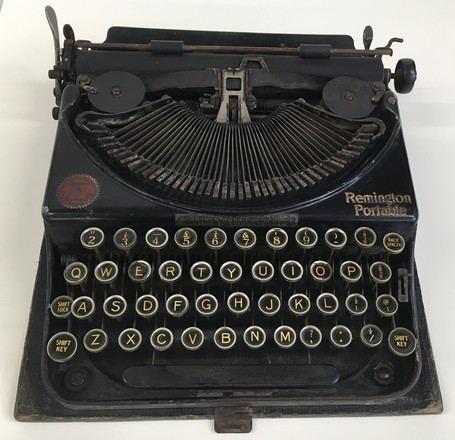Remington portable typewriter belonging to Douglas Stewart, c. 1922
Wood, enamel, steel, copper,
cotton, paper, synthetic polymer
R 883
Presented by Meg Stewart, 1989
Poet, journalist, writer, editor
and literary critic Douglas Stewart used this typewriter, which is part of the
Stewart family collection.
Stewart’s first volume of poetry
was Green Lions (1936) and his
best-known work was the verse play Ned
Kelly (1943). Stewart had 11 volumes of poetry published as well as
numerous volumes of literary criticism. He was awarded an Order of the British
Empire (OBE) and an Order of Australia (AO) for his contribution to Australian
literature.
Stewart was born in New Zealand; his writing and editorial
career saw him living and working in London and Sydney, where he settled in the
late 1930’s. The impact of the war can be seen in
some of his publications in the 1940s, including Elegy for an Airman (1940), published in a limited edition illustrated
by Norman Lindsay, as well as a collection of war poems, Sonnets to the Unknown Soldier (1941). The latter collection was
Stewart's first with Angus & Robertson, who would become his regular
publishers.
In 1945, Stewart married Margaret
Coen, a painter; their only child, Meg, was born in 1948. In the decade
following the end of the war, Stewart published three poetry collections with
Angus & Robertson, The Dosser in
Springtime (1946), Sun Orchids
and other poems (1952), and The Birdsville
Track and other poems (1955).
There is an annual Douglas Stewart Prize ($40,000) for a
prose work other than non-fiction. This Prize started in 2012 and previous
winners include Don Watson in 2015 for The
Bush.



 Back to list
Back to list